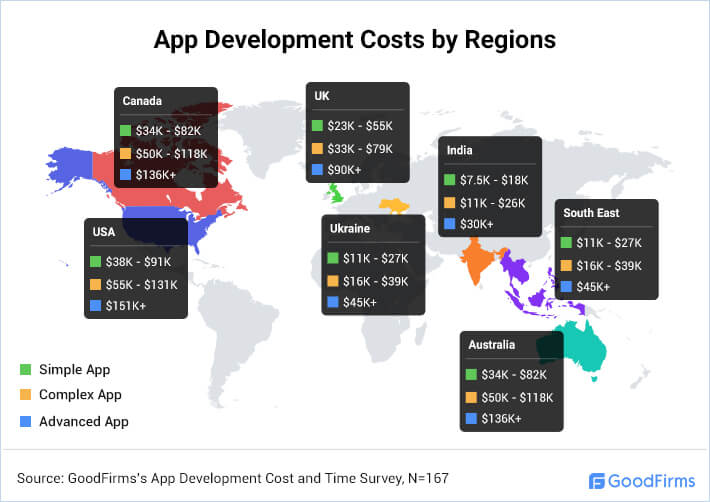As the mobile app user base is expanding, so is the pressure on companies to launch a better and more functional version of their mobile app quickly. However, developing or upgrading an application is not a cakewalk. It takes days to build, and when you want to add special features to it, the development might take even longer. That’s where React Native, one of the top JavaScript frameworks, comes to the developers’ rescue.
With the basic foundation of React and the features of a native app, React Native is the app development framework that can make any business’s app ready for today and tomorrow!
Trusted by Facebook and Instagram, React Native is one of those frameworks that allow programmers to build power-packed hybrid apps. Not only are the apps built in less than half the time, but they are difficult to differentiate from any native app in terms of their functionality and feel. But that’s not all!
There are many reasons why React Native is becoming a favorite of businesses and app development companies alike. Here’s a look.
Because It Gives A Native-Like Feel At Hybrid Cost
Want a native mobile application for both Android and iOS platforms but are short of funds? Hybrid app development solves the problem!
Limited funds and budget constraints are one of the biggest reasons why 90% of startups fail even before they reach the one-year mark. Getting separate Android app development and iOS app development services can rob any business of a large chunk of its budget. Even building a simple mobile application can cost you around $24,830 to $59,150. And this number goes as high as $36,107.5 to $85,150 when your app is furnished with some of the popular features!

That’s where React Native comes to the rescue.
With React Native, businesses can get a native app for Android and iOS while using the same components but at a hybrid cost.
Here is the line of reasoning that proves building a React Native app is the best option when the budget is not on your side.
- React Native apps can be developed in 33% less time. With less time taken for development, the overall cost of development is also reduced.
- Blocks can be created in React Native using reusable ‘native components’. The reusable components allow for saving time as well as money.
- Making a mobile app that’s responsive to all mobile screens can be costly. React Native mobile apps are seamless to work on a maximum number of devices seamlessly.
Moreover, many people doubt that getting a cross-platform app would sacrifice the performance of the mobile app. That’s never the case with React Native app development!
The app is built on React Native functions without a WebView, like a native app using JavaScript elements as native platform widgets. Moreover, React Native developers have a set of platform-agnostic native components like Text, View, and Image. These components can be mapped into the native UI building blocks of the platforms to offer a true native app experience.
Because Once Learnt, It Can Be Written Everywhere
The majority of other cross-platform or hybrid app development frameworks, like Ionic, Flutter, and others, have functionalities like complete SDK, using Dart’s compilers for native ARM machine code compilation. In these frameworks, developers write the code once and then reuse the same code across all platforms. This leads to a bad experience and subpar performance of the application on both Android and iOS.
React Native, on the other hand, does not have separate features or functionalities. It knows that Android and iOS platforms are different, and their codes should be different, as well. So, how does it save time while offering native-like app development?
This can be explained through its tagline ‘Learn Once, Write Anywhere.’
React Native allows the developers to create platform-specific versions of the components. This will enable them to have a single codebase that can be used to share codes across all the platforms (here, Android and iOS). The React Native developers need to learn this language once, and they can use the same codes and logic layer for building both Android and iOS applications.
Once they have learned the codes, they can create new features and integrate them as features without having to rewrite or change the entire code.
Because It Lets You Build Better UI
React.js was launched in 2013 by Facebook as it needed a better UI or user interface. This was a new JavaScript library that offered the same speed as the JS apps, but the rendering of pages was done in a rather dynamic manner.
React Native, an updated JavaScript framework works on the same workflow and syntax as React but with a different set of components. Hence, the UI factor of React that made it so popular among developers remains robust even when you use React Native for your app development.
In simpler words, React Native is all that React.js offers and much more. So, you get a more powerful native application with a better UI. The CSS-like stylesheets in React Native let you effortlessly mark the height, weight, borders, fonts, colors, margins, and other things of the mobile application. Thus, giving them full developers’ freedom to play with the UI and making it more seamless, interactive, engaging, and user-friendly.
Because It Offers Streamlined Web Page To App Migration
Today, businesses have realized that more than 90% of internet time is spent on mobile apps rather than browsers. Having an application for them is as essential as promoting their products. These apps act as a communication channel and even allow businesses to provide a personalized experience for increased sales.

However, most of them are drained of funds after the creation of their website. React Native comes to help in such scenarios.
Transforming a website built on React.js into a mobile app and that too for both Android and iOS could be a challenge. Migrating your web app into a mobile application becomes super streamlined and straightforward when you use React Native.
True, transforming a web page into a mobile app was never this easier!
With React Native, developers can reuse the codes and make a single update to transform the web app into fully-functional mobile applications for both Android and iOS. The interface of React Native is quite clear and proper, owing to the intuitive codes and the fragmented modules.
This makes it easier for the developers to analyze and understand the codes that are running by the application. Once they know the codes, creating an app by using the same codebase becomes much easier.
Because Its Apps Are Fast & Use Less Space
When you are developing a mobile application, it is essential that the app is fast to load and does not take up too much space on your target audiences’ devices. With React Native, you can build an app that requires way less space and memory than any other native application.
Reducing the React Native app size before launching it on the app store or play store is essential to gain more downloads. It is statistically proven that larger apps, unless too effective, do not get many downloads. People prefer smaller apps. They are easier to commit.
Moreover, one of the main reasons why people are inclined towards React Native for their app development is that it can offer the speed that WebView-based frameworks cannot provide. It can even offer as many as 60 frames per second in an app with a native look and feel.
Speed is an added advantage for the developers as well. React Native has a hot reload that lets you check any changes made in the code in real time. So, you need not wait for any particular changes to be reflected after the native builds are finished. You can update, save, see the changes live, and repeat.
Because It Is Here To Stay & Become Powerful in the Future
With the vast developer community of Facebook supporting it, React Native is here to stay. More and more developers are showing interest in building their mobile applications on this 2015-launched Javascript framework.
Offering a reduced time-to-market and cutting down the development costs, React Native is here to stay and make you future-ready. Don’t believe us? Here are some points that will prove it.
- With 84.8k stars, React Native is popular among developers and Github’s 14th most starred repository.
- 2,058 contributors have made 19,339 commits in 108 branches for React Native.
- Since its initial launch in 2015, this framework has already seen over 335 releases, and with each release, it has launched new features and functionalities to help the developers.
- React Native, as a search term, has even surpassed the search queries for Android development and iOS development. Thus, indicating the growing popularity of React Native.

- To save time and effort, more developers and even businesses would turn towards React Native development as it lets them build iOS and Android apps with the same codebase.
- To add platform-specific authenticity to the React Native app, you need to add native code without disturbing the existing codes.
- It is excellent from the user's point of view as it allows real-time updates on phones without going through any manual update cycle.
- Finally, it is supported by the Facebook community.
And That’s Why!
Undoubtedly, React Native is here to stay and help build a better and more powerful mobile application. For businesses planning to create an innovative and competitive app, React Native is the framework to build it on. And most importantly, its codes are effortless to learn and understand. So, if any business sees back out from its regular React Native developer from the project, they can merely onboard any new developer or even get on with it as well.
If developing a multi-dimensional app is your requirement, React Native should be the JavaScript framework you should use.








